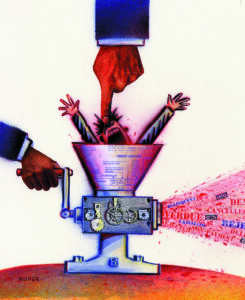Krugman: Our ‘Worst Fears’ About Long-Term Unemployment Damage Are Being Confirmed
As lawmakers on both sides of the aisle spend copious amounts of time on their seemingly futile quest to reach an agreement about how to deal with the nation's burgeoning debt, there's an even bigger economic problem in the U.S.: unemployment.
As lawmakers on both sides of the aisle spend copious amounts of time on their seemingly futile quest to reach an agreement about how to deal with the nation’s burgeoning debt, there’s an even bigger economic problem in the U.S.: unemployment. Roughly 4.6 million Americans have been unemployed for at least the last six months, while an additional 3 million have been unemployed for a year or longer.
The explosion of long-term unemployment in the five years since the economic meltdown isn’t just a tragedy for those unemployed — it could also be a “broader economic disaster,” New York Times columnist Paul Krugman writes in his latest op-ed piece.
“Even as the case for debt hysteria is collapsing,” Krugman argues, “our worst fears about the damage from long-term unemployment are being confirmed.”
The Nobel Prize-winning economist says the key question is whether the long-term unemployed will be deemed unemployable, “tainted goods that nobody will buy.”
“This could happen because their work skills atrophy, but a more likely reason is that potential employers assume that something must be wrong with people who can’t find a job, even if the real reason is simply the terrible economy,” Krugman writes, noting there’s mounting evidence that suggests the long-term unemployed are being tainted.
One piece of evidence that points to this being the case is the relationship between unemployment and job openings. These two figures normally move inversely, Krugman explains: As more jobs open up, fewer Americans become unemployed. Now, evidence shows that this is no longer happening. Even as the number of job openings rises, the long-term unemployed are remaining just that–jobless.
The end result, Krugman concludes, is we’re “creating a permanent class of jobless Americans.”
Paul Krugman via The New York Times:
And let’s be clear: this is a policy decision. The main reason our economic recovery has been so weak is that, spooked by fear-mongering over debt, we’ve been doing exactly what basic macroeconomics says you shouldn’t do — cutting government spending in the face of a depressed economy.
It’s hard to overstate how self-destructive this policy is. Indeed, the shadow of long-term unemployment means that austerity policies are counterproductive even in purely fiscal terms. Workers, after all, are taxpayers too; if our debt obsession exiles millions of Americans from productive employment, it will cut into future revenues and raise future deficits.
Our exaggerated fear of debt is, in short, creating a slow-motion catastrophe. It’s ruining many lives, and at the same time making us poorer and weaker in every way. And the longer we persist in this folly, the greater the damage will be.
— Posted by Tracy Bloom.
Your support matters…Independent journalism is under threat and overshadowed by heavily funded mainstream media.
You can help level the playing field. Become a member.
Your tax-deductible contribution keeps us digging beneath the headlines to give you thought-provoking, investigative reporting and analysis that unearths what's really happening- without compromise.
Give today to support our courageous, independent journalists.









You need to be a supporter to comment.
There are currently no responses to this article.
Be the first to respond.